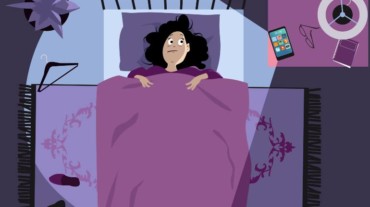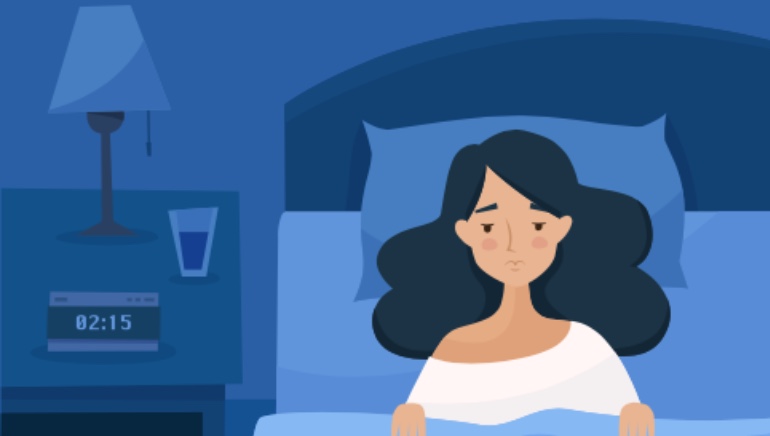
Do you often go to bed late or sleep? While these might seem like no big deal, they might be indicative of something serious. Recent research has linked all these habits to poor glycemic control after studying 194 patients with type-2 diabetes.
What’s the connection between diabetes and sleep?
Diabetes experts say when we get adequate sleep, we may have an easier time controlling our blood sugar. “High blood sugar levels impact our sleeping habits. Both high and low blood sugar levels interrupt our sleep, hence, leaving us feeling tired the whole day”.
“Sleep disturbances are common in people with diabetes mellitus. When compared with non-diabetics, patients with diabetes reported higher rates of insomnia, excessive daytime sleepiness, and unpleasant sensations in the legs that disturb sleep,” states Dr Samit Ghosal, consultant endocrinologist, Department of Endocrinology, Nightingale Hospital, Kolkata.
He added, “We tend to find ourselves more alert during the day, have more energy, feel less stressed and have a better mindset for monitoring and managing diabetes.”
Also, Read: 5 expert-recommended ways to prevent diabetes if you’ve got it in your genes
What physical changes can occur in a diabetic person due to inadequate or interrupted sleep?
When we do not sleep well or feel less comfortable while sleeping, we feel unsettled or irritated the whole day. Our body tends to feel tired, as a result of which we may also suffer from certain sleep disorders like sleep apnea, restless leg syndrome, insomnia, etc.

Lack of sleep also increases the risk of obesity, which going forward may be a risk factor for type-2 giabetes.
What are the symptoms associated people who find it difficult to sleep?
1. High blood sugar levels can cause frequent urination. If the blood sugar is high at night, the person could end up getting up frequently to use the bathroom.
2. When the body has extra glucose, it draws water from the tissues. This can make one feel dehydrated, prompting to get up for regular glasses of water.
3. The symptoms of low blood sugar, such as shakiness, dizziness, and sweating can also affect sleep.
Select Topics of your interest and let us customize your feed.
PERSONALISE NOW4. Another common cause of disturbed sleep in diabetics is discomfort or chronic pain in the legs or arms. Restless legs syndrome and periodic limb movements can cause difficulty falling asleep as well as staying asleep.
Also, Listen:
It is important to identify sleep disorders in patients with diabetes because improving sleep and treatment of sleep disorders such as sleep apnea can improve glucose control, health, and quality of life.
How can the power of sleep be used by a non-diabetic for diabetes prevention?
Sleep is important for the restoration and repair of the body at a cellular level. Poor sleep affects the body both directly and indirectly by triggering changes to hormones, leading to weight gain and obesity, and causing changes to behavior and lifestyle.
A non-diabetic person can follow the below routine to have a better sleep routine:
1. Avoid the use of cellphones at night. This will reduce the stress on the eyes while using the electronic device. The more relaxed the body feels, the less are the chances of diabetes.
2. Stay regimented in the sleeping patterns. People should follow a definite pattern of the sleep cycle. Waking up on time and sleeping on time each night, will create a healthy lifestyle around them.
3. Stay away from stimulants at night. People should avoid drinking caffeinated beverages like coffee and tea, at night. Learn relaxation and breathing techniques.
4. Listen to a relaxation audio or nature sounds.
5. Get regular exercise, no later than a few hours before bedtime.
6. Don’t use caffeine, alcohol, or nicotine in the evening.
7. Avoid or minimize napping.
8. Get out of bed and do something in another room when you can’t sleep. Go
back to bed when you’re feeling drowsy.
9. Use the bed only for sleeping and sexual activity. Don’t lie in bed to watch TV or read. This way, your bed becomes a cue for sleeping, not for lying awake.
Also, Watch:
It important to pay attention to your sleeping patterns and design healthy habits around your good night’s sleep. In case you are suffering from diabetes, monitoring your sleep can directly impact your blood sugar levels and overall sleep health. Although both diabetic and non-diabetic people need to become mindful of their sleep routine.
(with inputs from IANS)
Get Latest Updates on Health News